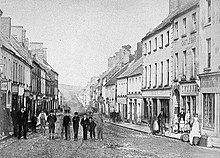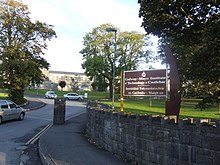Castlebar
[3] A campus of Atlantic Technological University and the Country Life section of the National Museum are two important facilities in the area.
The modern town grew up as a settlement around the de Barry castle, which was built by a Norman adventurer in 1235 and was later the site of an English garrison.
Under the charter the town had a portreeve (mayor) and a fifteen-member corporation and was entitled to elect two members to the Parliament of Ireland.
French forces under the command of General Jean Humbert aided in a rout of the British garrison in the town during the failed Irish Rebellion of 1798, which was so comprehensive it would later be known as "The Races of Castlebar".
[7] A short-lived provisional Irish Republic had been declared upon General Humbert's arrival at Killala.
Following the victory at Castlebar John Moore, head of the Mayo United Irishmen and the brother of a local landowner, was declared president of the Province of Connacht.
[8] Castlebar Military Barracks was established in 1834:[9] it was finally closed in March 2012 and the buildings and grounds have been purchased by the local town and county councils.
[10] The Irish National Land League was founded by Michael Davitt, of Straide in County Mayo, at the Imperial Hotel in Castlebar on 21 October 1879.
[24] During the 1970s and 1980s the town hosted the International Castlebar Song Contest which was televised nationally on RTÉ.
[30] Castlebar is home to the health care company Baxter Healthcare and manufacturer Fort Wayne Metals.
It suffers from chronic congestion, particularly in the summer months when thousands of tourists have to negotiate the bottleneck en route to neighbouring Westport and Achill Island.
A bypass of Castlebar of dual-carriageway standard was approved by An Bórd Pleanala in July 2014,[32] and construction began in late 2019.
[41] In the early 21st century, the Mayo county board oversaw the building of a new stand with dressing rooms and offices underneath.
[citation needed] Castlebar RFC, a rugby union club and one of the original founding members of the Connacht branch of the IRFU in 1885, reformed 1928 and again revived in the 1970s.








